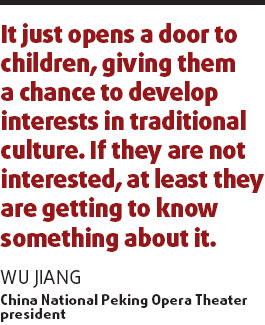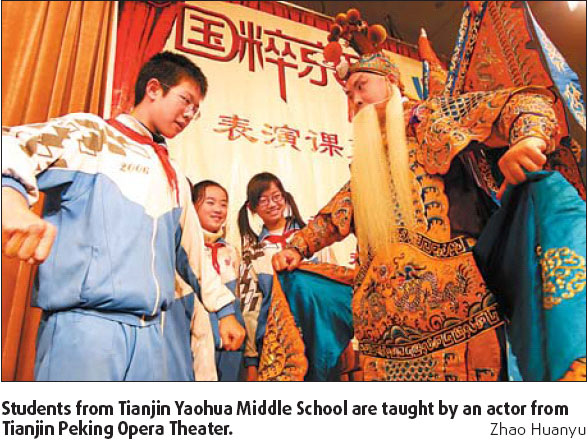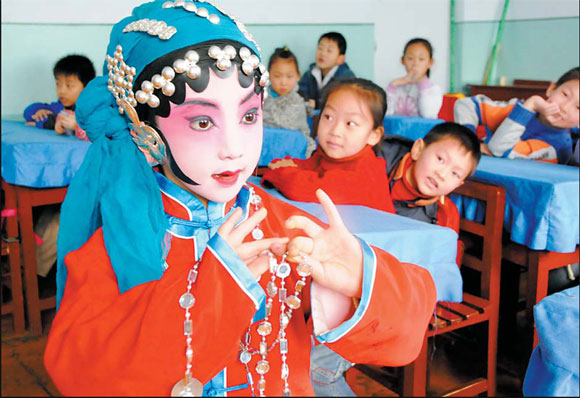Peking inside the classroom
|
A girl from a Peking Opera class in a kindergarten gives a performance for primary school students in Harbin, Heilongjiang province. Zhang Qingyun |
The image of a huge cartoon monkey, wearing a bright red Peking Opera mask, is projected on a school classroom wall behind a plump young man, making soft gestures with his not-so-slim fingers. The unexpected visitor - a traditional Peking Opera character - causes the 30 students to erupt with excitement.
Ma Yu's drawing class differs from others thanks to the use of videos projected on the wall. The moving images feature Peking Opera stunts, delicate costumes, legendary Chinese figures and complicated weapons. To boost the mood, background music of clanging drums is added.
"I like painting colors on the masks of different Peking Opera figures like the Monkey King," says Wang Jinghao, an 11-year-old boy, closely following the antics of the monkey making faces on the screen.
Fascinated by Peking Opera from the age of 12, Ma discovered a way to share his passion with students at the Nanluogu Xiang Primary School - one of the very last alley (hutong) schools in Beijing.
"Peking Opera reflects the unique aesthetic view of the East: implicit, profound and symbolic. The kids should know something about it," says the softly spoken, well-groomed 33-year-old.

Ma was unaware the Ministry of Education had launched a pilot program in late February to introduce Peking Opera into 20 elementary and middle schools in 10 provinces. The program teaches 15 arias - a solo vocal piece - with the aim to promote and revitalize traditional Chinese culture.
"Why music courses? There are many other ways to teach children about Peking Opera. A drawing course is also a good option," Ma suggests.
The 200-year-old Peking Opera is a synthesis of music, dance, art and acrobatics. It is widely regarded as a Chinese cultural treasure. The ministry's plan is being questioned by some, who believe the course will further burden already busy students. "And if Peking Opera is included, why not other forms of local opera," the critics say.
Ministry spokesman Wang Xuming stresses that the Peking Opera classes were not compulsory nationwide. Instead, they were pilot programs implemented in certain schools from March to July.
"We chose Peking Opera because it is our national cultural treasure. The pilot will not extend to other local operas," he says.
His words were corroborated by Wu Jiang who selected the 15 arias. "The plan is not aimed to foster Peking Opera artists or fans," says Wu, also the China National Peking Opera Theater president.
"It just opens a door to children, giving them a chance to develop interests in traditional culture. If they are not interested, at least they are getting to know something about it."
Wang Keying, a 7-year-old student at Zhongguancun No 1 Primary School in Beijing, enjoyed her first Peking Opera class at the start of the new semester. "I like the course. At least I can watch TV, which my mom never allows me to do except on weekends," the girl says. However she admits she cannot hum a single bar of a Peking Opera aria.
Gao Mukun, a National Peking Opera Theater actor, who has spent 40 years on the stage, says he supports the plan wholeheartedly. "Teenagers are more easily to accept novel things, and so why not help them know more about their own culture?"
When he was 8 years old, he remembers his own fascination with Peking Opera, something that eventually turned into a lifetime career. "It's our cultural heritage from our forefathers. Just like the Great Wall, Peking Opera will exist as long as China."
But not every Chinese is a fan. Xue Yan, a Langya Road Primary School music teacher in Nanjing, capital of Jiangsu province does not have the slightest interest in Peking Opera.
"It (Peking Opera) is something like antiques and should be sent to a museum," the 25-year-old woman frowns. She says her favorite entertainer is Jay Chou, a pop singer from Taiwan.
A poll by Sina.com, the country's top portal website, reveals that less than 30 percent of the 25,000 people surveyed support the ministry's plan.
Zhang Yiwu, a Peking University Chinese literature professor, suggests prudent research should have been carried out on the government plan before it was unveiled to the public.
About 400m from Ma's workplace is the Central Drama School, a dream academy for thousands of Chinese teens who desperately want to become another Zhang Yimou or Zhang Ziyi, both famous Chinese movie personalities.
Many of its students are former Peking Opera school graduates, such as Qin Hailu who won the best actress at the Hong Kong Film Awards in 2000 when she was 22.
Qin spent nine years studying Peking Opera before enrolling at the drama school in 1996. Fame came after four years of diligent study.
"You could hardly imagine how tortured I had been in the opera school, exactly the same as Farewell My Concubine, the film directed by Chen Kaige," Qin said on a TV talkshow program. She said singing Peking Opera arias was the last thing she wanted to do.
The old Chinese proverb "one minute on the stage and 10 years of practice off the stage" provides a vivid picture of how hard a Peking Opera performer works to attain applause.
Since the founding of New China in 1949, the country has started to reform old opera troupes. This later turned into the creation of various Peking Opera schools around the country.
For example, a 10-year-old child will spend at least eight years in the Nanjing Opera School before performing on stage. Chances are even slimmer he or she will be enrolled by drama schools, or do something that could lead to TV or movie roles. For some, graduation is not a desirable thing as it means they have no other skills outside of entertainment.
Fang Hua, a teacher at the Nanjing school, has attractive big eyes, a dulcet voice and delicate fingers - all the ideal physical assets needed for Peking Opera.
The 33-year-old graduated from the school 12 years ago and found a job in a troupe in which she spent 10 years. She says the audience is shrinking. "I can only stand on the stage two to three times a year, which is not what I want," Fang says. Instead, she chooses to teach students Peking Opera.
"I understand the ministry wants to help preserve this national cultural treasure, but how? A plan of 15 opera arias for students of the 200 schools around China is not the good way to do that."
Yang Qianwu, Beijing Dramatists Association vice-chairman, says all the 15 pieces selected are easy for children to sing. "Even the model Peking Opera arias developed in the 1960s reflected the highest achievement of reform in Peking Opera. He agrees with Fang that students should have more choice.
Zhang, the Peking University academic, echoes Yang's opinion and offered a proposed "art education package". His proposal includes Peking Opera, and also operas from other parts of China, or even from other countries, as all of these were man's cultural heritage.
It is much easier for those schools lacking Peking Opera teaching resources to handle, and Zhang thinks teacher Ma's class has provided an off-the-shelf solution.
"Why be so restricted by the forms, since the ultimate goal of all art education is to make people's lives beautiful and substantial."

(China Daily 03/11/2008 page18)















